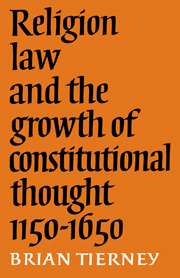Book contents
- Frontmatter
- Contents
- Dedication
- Preface
- I Introduction
- II Juridical foundations: society, church, and law, 1150–1250
- III Origins of jurisdiction: hierarchy and consent, 1250–1350
- IV Popular sovereignty, federalism, and fundamental law: Azo to Althusius
- V Corporate rulership and mixed constitution
- VI Conclusion
- Select bibliography
- Frontmatter
- Contents
- Dedication
- Preface
- I Introduction
- II Juridical foundations: society, church, and law, 1150–1250
- III Origins of jurisdiction: hierarchy and consent, 1250–1350
- IV Popular sovereignty, federalism, and fundamental law: Azo to Althusius
- V Corporate rulership and mixed constitution
- VI Conclusion
- Select bibliography
Summary
The first emergence of sophisticated, consciously held constitutional doctrines from the chaos of the early medieval world was a little like the emergence of life and consciousness itself – as the scientists currently tell the story – from the primeval ocean of inanimate matter. In the old medieval ocean of folk customs unthinkingly observed and religious practices unreflectively pursued, molecules of conscious questioning thought appeared, usually at points where elements of religious and secular thought coalesced. Eventually the molecules came together in complex aggregates, like living organisms capable of reproducing themselves in the minds of men. Capable of reproducing themselves! But at that point all the problems of selection and adaptation and survival arise.
Even when all the evident gaps in our knowledge have been filled in, we shall still no doubt have our problems in understanding the whole evolution of Western constitutional thought – the nature of its origins and the reasons for its survival. The problems are implied in a crisp sentence of Christopher Hill: ‘The seventeenth is the decisive century of English history, the epoch in which the Middle Ages ended.’ The difficulty here is that, in the realm of constitutional theory, nothing of the sort happened. During the Middle Ages an unusual structure of constitutional thought arose. Its exponents were preoccupied with consent, legitimacy, community rights, and, beyond these generalities, with rather technical problems concerning the relationship between central and local government, representation, rights of resistance, collegiate sovereignty, the distribution of authority within a complex collegiate sovereign. Such themes are common to medieval law, to fifteenth-century conciliarism, and to seventeenth-century constitutional theory.
- Type
- Chapter
- Information
- Publisher: Cambridge University PressPrint publication year: 1982

